
by Purnima Ramakrishnan | Apr 11, 2014 | 2014, Brazil, Human Rights, Humanitarian, Humanity, Purnima, Social Equality, Social Good, The Alchemist, World Moms Blog, World Voice
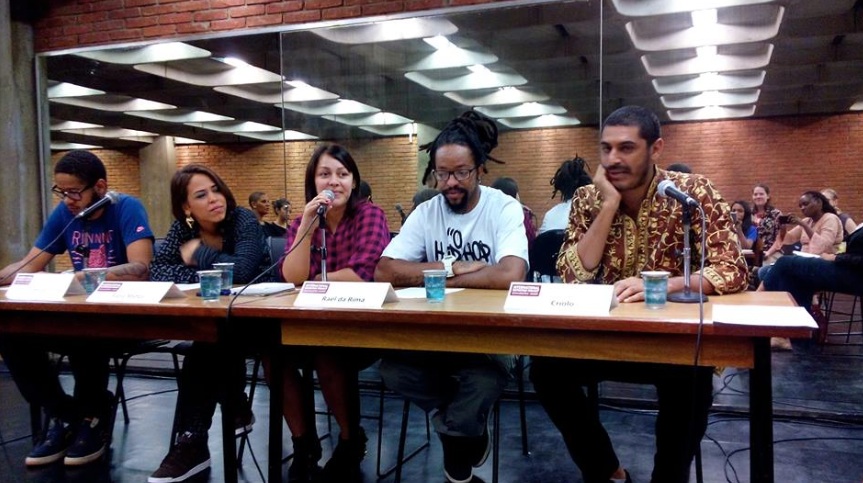
Centro Cultural Sao Paulo
Our visit to Sao Paulo with The International Reporting Project was coming to a close. After a very hectic day of Community heath visits and chatting with doctors, nurses, and community health workers, we just had to do something very cool. And what nicer thing than to rap our way into it?
We met the awesome International acclaimed Brazilian rap group at Centro Cultural Sao Paulo, and it was a great honor to be in their presence.
In the 1990s a musical style known as rap consciencia (socially conscious rap) originated in Brazil. These days it is making huge waves and improving the lives of people by making them socially conscious of their choices, their lifestyles, rights, issues, and gently coaxes them to dream of things which generally are taboo to dream about, for the Afro-Brazilian ethnicity.
Criolo was 11 years old when he started writing lyrics and now he has chart busters in London, New York and Paris. At the tender age of 11 he wrote about social issues. Social inequality is a major problem in Brazil. There is still prejudice across Brazil.
Criolo said, “there are so many ways to live. To wake up, to eat, to get to work and then get some money and then to eat again, is one way. If that is to live, it means people sell themselves for some food and money. That is just a process. Stop it. Live life. Let us talk about ourselves, our passions and aspirations and our joys.”
Rael da Rima was 11 when his music band used to talk about social injustice, racism, and equality to all. He talked a little bit about his personal life, and how rap music changed his life, and the lives of people living around him.
He said, “I give you an analogy for the social inequalities in Sao Paulo. Some people use this mineral water (indicating the drinking water on the table) to wash their BMW cars, and yet some do not have access to clean drinking water. Sao Paulo is a city of extreme contrasts. I sing so that people consciously become aware of their own lives and strive to improve it.”
Rael singing of his passion for rap music:
Emicida says, “When I was young, to get into college was not something youngsters would think about. Just to let the day go by was an accomplishment. Nowadays when I walk through the favela(slum) I grew up in, I am so happy to see the youngsters talking about their dreams of being in college and to get a ‘real’ job. When slavery was abolished, it was both a curse and boon. A curse because people were pushed into poverty and violence with no support system, a lot of confusion, and no real understanding of what was happening in society or the political and economic scenario of the country. My rap is to inspire people to talk about their dreams, how to get out of social inequalities and to be truly free. In everyone there is a human being and I wish for each one to know it. Through rap music, the magic of communication is established, and people are inspired to know themselves as such.”
Emicida singing for World Moms Blog
Flora Matos was 18 when she decided to move to Sao Paulo from Brasilia. She sings so people are free of sexual prejudice. She says her music always speaks of love – love for all kinds of people – love for humanity as a whole and breaking anything which could make people hate each other.
Flora Matos singing of love – love for people, passions, and love for all of humanity
These musicians and others like them are not people who sign on big labels or crave all of the fame and popularity. They just want justice, recognition of the minorities as human beings, and some peace for their community. And they do it through rap music.
They sing about poverty, prejudice, abuses of various types, about the blacks and whites in Brazil, and the classes. Flora said, all her numbers are characterized by experiences, either her own, a friends or someone she knows about. So this idea of communication which Emicida says – that is the magical bond – is established. This communication through music is not just passing of information or ideas or activism – it is an expression to bond humanity, a gentle prod to awake, and be aware. So through the actual performance the listeners carry back this vital element of being part of the movement.
So even though they do not directly change anything, or may not be able to give statistics and figures, they change attitudes, and invest in developing agents of change – which is a very vital thing to forge a developing society, progressing towards success.
I am not a big fan of music, not even Indian music, but that day I promised Criolo I would look him up on Youtube. He was mildly surprised to know that I came for a meeting with rap artists when I was not into music at all. I explained that it was because I learnt they worked for social causes through music, and I was interested in that. He wished me luck and said he would look up World Moms Blog too and we parted.
Just for fun, I also recorded some street musicians the other day in Sao Paulo’s Avenida Paulista, one of the poshest locality in Sao Paulo. I cant help sharing the below one.
This is an original post to World Moms Blog by Purnima Ramakrishnan, our Indian mother writing from Chennai, India. Her contributions to the World Moms Blog can be found here. She also rambles at The Alchemist’s Blog.
Photo credit to the author.
Purnima Ramakrishnan is a fellow of Journalism with the International Reporting Project (IRP), reporting from Sao Paulo, Brazil. Follow on Twitter at #BrazilMDGs

by Tara Bergman (USA) | Apr 11, 2014 | 2014, Being Thankful, Communication, Health, Humanity, Inspirational, Life Lesson, Maternal Health, Tara B., USA, World Motherhood
 I was mentally sabotaging my morning run before the day even started. I laid in bed the night before thinking about how I was getting to sleep too late after eating too much junk when I knew I was coming down with a cold. I had not set myself up for success and felt guilty. I tried to tell myself if I was that beat tomorrow, I would skip it. I woke up in the middle of the night twice for other reasons but couldn’t help but think of how I tired I would feel come morning.
I was mentally sabotaging my morning run before the day even started. I laid in bed the night before thinking about how I was getting to sleep too late after eating too much junk when I knew I was coming down with a cold. I had not set myself up for success and felt guilty. I tried to tell myself if I was that beat tomorrow, I would skip it. I woke up in the middle of the night twice for other reasons but couldn’t help but think of how I tired I would feel come morning.
As I prepped the kids for school and got through breakfast with way too much coffee, I told myself how I was not well-hydrated and would be dragging. Should I even go? I kept moving but my inner voice whispered that I could just walk today if I felt overwhelmed. That voice said, “Listen to your body. If you don’t feel up to it, don’t do it.” Then a competing inner voice mocked, “But it’s your own fault for not feeling up to it, so go suffer through it.” I carried on.
When I got to the trail, I saw flashing lights up ahead. I almost stopped, thinking I should not run that way. However, I pushed on telling myself to see what the lights were about before bailing. They were just for a parked maintenance vehicle being unloaded, so I jogged on.
I was sluggish the whole time. I felt slow, heavy and bummed about not taking better care of myself. Still, I kept going. I told myself I would cut it short if it felt like too much, but then I knew the negative self-talk would grow. My knee was a little achy, and my spirits were low. Nonetheless, I kept putting one foot in front of the other and tried to lose myself in some music.
Then I spotted a young woman I often see on the trail. She is gorgeous with long hair, bright eyes, and slim body. She usually takes long walks, and we exchange waves and smiles as I go past. Today as we crossed paths, she was jogging. She stopped and told me in a panting voice that I had inspired her to stop walking and start running the trail. I congratulated her on her efforts, and we both went on our ways. All of a sudden, I was lighter. I ran without issue. I didn’t think of my knee, my weight or my tiredness. I just ran and finished up the run on a high note.
Her simple compliment made such a difference on my perspective. This beautiful woman told me I had kicked her butt into gear. I had fallen into the trap of cutting myself down mentally while assuming this other gal had it all together. How could she not?
But we all have stuff. We all have the stories we tell ourselves.
I’m an upbeat person who usually focuses on the good, but like everybody, I have days (like today) when I focus on the bad. The fact that this gal stepped out of her comfort zone both to run and to tell me, a stranger, that I had inspired her to do so snapped my head back on straight. Her gesture reminded me of a few things that I know to be true:
1) Just getting out and taking each step counts, even if it’s not your best performance. Looking back, I placed so many obstacles in my own path for this run, but I pushed past each one. Not my best run, but I still did it. That is worth something.
2) There is always going to be someone achieving in an area that you are not. Someone will always be smarter, thinner, happier, healthier, wealthier, etc. It’s okay to admire or be inspired by that someone, but do not judge yourself harshly by that someone. Measure yourself against yourself.
3) Everybody has challenges and doubts going on. Everybody. We’re human. We’re not perfect.
4) It never hurts to tell someone, even a passerby, something nice. You may just change their whole day. You may just change their whole life. Kind words are that powerful.
My trail acquaintance probably has no idea how much her words impacted my day. When I see her next time, I’ll tell her. Plus, I feel prompted to tell someone else how they inspired me. I have been meaning for some time to tell a certain person how they unknowingly helped me to make a life change for the better. I haven’t done so yet, despite ample opportunity, because I don’t want to seem too familiar to an acquaintance. However, today has taught me that hearing you changed someone for the better is never too familiar.
Have you received an unexpected compliment that changed your day? Is there someone who has unknowingly inspired you to try something new, and have you told them?
This is an original post to World Moms Blog by Tara B. of Washington (State), USA.
Photo credit to the author.
Tara is a native Pennsylvanian who moved to the Seattle area in 1998 (sight unseen) with her husband to start their grand life adventure together. Despite the difficult fact that their family is a plane ride away, the couple fell in love with the Pacific Northwest and have put down roots. They have 2 super charged little boys and recently moved out of the Seattle suburbs further east into the country, trading in a Starbucks on every corner for coyotes in the backyard. Tara loves the outdoors (hiking, biking, camping). And, when her family isn't out in nature, they are hunkered down at home with friends, sharing a meal, playing games, and generally having fun. She loves being a stay-at-home mom and sharing her experiences on World Moms Network!
More Posts

by Nancy Sumari | Apr 2, 2014 | Awareness, Food, Humanity, Nancy Sumari, Parenting, Uncategorized, World Moms Blog

Living in a developing country and being blessed enough to be able to work, provide for your family and get by, is considered lucky.
In Tanzania people are considered poor when their consumption is below than the national poverty line. Consumption includes all goods that are bought, as well as those produced and consumed at home. This includes food, household equipment, clothing, personal effects, personal care, recreation, cleaning, domestic services, contributions, fuel, petrol and soap.
Over the years, I have always had a sense of responsibility and felt the urgency to work towards bridging gaps in poverty, through advocating for education and engaging in activities, big and small, in sectors like health and social change in an attempt to bridge this gap.
After having my daughter, I understand the notion that every parent wants the very best for their child. It does not escape me how truly blessed we have been to be able to provide for her. What I’m struggling with now is excess, conservation as well as teaching her to understand that she really is no different than another young girl from the other side of town who does not have the luxury of being able to enjoy three healthy meals a day and who cannot afford to go to school. I hope to be able to awaken this sense of responsibility towards poverty and the gaps in society in my daughter.
One evening, I came home after a visit to a school in Dodoma, the country’s capital, where I had been working to raise funds for building a girls’ hostel. These students were going through horrors every day; from 16 kilometer walks to and from school, to living in deplorable conditions, to being subject to burglary and rape. It was really weighing in on me.
I walked in to find my younger brother and my daughter watching TV with the sound on really loud. She was playing a game on the iPad and lights were on all around the house. Excess. They had just had dinner and both seemed to be almost just laying there. or me that was a turning point. Things had to change. Scaling down was imminent.
High on our agenda these days is use of only what we need. Above all is practicing gratitude. When she is old enough to understand, I will introduce her to the reality of the way things are in the world.
It really strikes me though, time and time again, just how different lives are. Not to bite the hand that feeds me, but it seems almost unfair that some have so much while others have so little. What makes us special to be the “Haves” and them the “Have Nots”?
My struggle these days is just to try and get it.
What are your thoughts? How do you teach your kids about giving back?
This is an original post by Nancy Sumari from Tanzania. You can find more of her writing at Mama Zuri.
Photo credit to Wheeler Cowperthwaite

by World Moms Blog | Mar 10, 2014 | 2014, Awareness, Bilingual, Communication, Cultural Differences, Culture, Elections, Eye on Culture, Guest Post, Human Rights, Humanity, International, Language, Life Lesson, Living Abroad, Media, Multicultural, Politics, Tragedy, USA, World Events, World Interviews, World Motherhood, World Tour, World Voice
Today, we have a special guest post by a Ukranian mother living in the United States, Olena Centeno, of Bilingual Kids Rock. Olena opens the window and lends us her personal perspective to the current events in Ukraine…
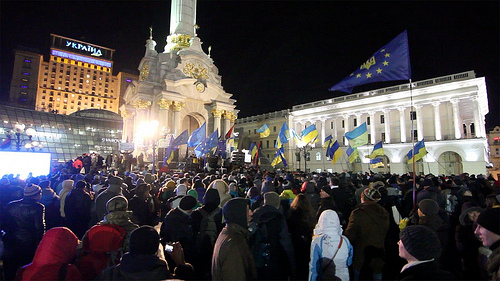
Protest in Kiev, November 2013
What’s it like growing up in Ukraine?
As a Ukrainian, I grew up speaking two languages: Russian and Ukrainian. I ate Ukrainian borsht for lunch and Russian pelmeni for dinner. I love Tchaikovsky’s Sleeping Beauty and Carols of the Bells by Leontovych. I am raising my own children trilingual in English, Russian and Ukrainian. In fact, the two cultures (Russian and Ukranian) are considered so close, that if an Ukrainian abroad says s/he is from Ukraine people often say “Oh, so you are from Russia?”
What’s going on between Russia and Ukraine?
With Russian troops moving across the sea into Ukraine’s Crimean peninsula, a lot of Westerners are starting to ask this question.
The current conflict in Ukraine is more than three months old. It began with a peaceful demonstration on November 21 at Independence Square (Maidan) in Kiev, the capital of Ukraine, when the (now ousted) Ukrainian president (Yanukovich) hesitated to sign an Association Agreement with the EU. This had been one of his major election promises and in breaking it he ignored the desire of millions of Ukrainians.
During the past three months, the “EuroMaidan” demonstration has grown into a much bigger movement. It started as a response to the failed EU deal but then truly turned into a movement against the corrupt government of president Yanukovich, who moved to keep Ukraine in long-lasting and very painful economical ties with Russia.
Then, after the government passed harsh, anti-assembly laws, it became about the basic human right to be able speak and think freely without being punished for it.
More than a hundred lives were lost and thousands injured during violent attempts to remove the demonstrators but people did not leave the cold streets of Kiev. More freedom fighters came from all over Ukraine to support them. Many other Ukrainian cities stood up as well. After three months of struggle, Mr. Yanukovich was impeached and left Ukraine (he refused to sign a resignation; he just ran away). His presidency was considered illegitimate and a new, temporary government was elected.
As Ukrainians were mourning over lives lost and looking into the future with great hope to build their country on principles of trust and freedom, a new enemy emerged: Informational War.
Along with Russia, Eastern Ukraine—where the majority is Russian speaking—is dominated by Russian-language news from the Russian media. Unfortunately, the Russian media coverage of events that have happened over the past three months is falsified [and full of propaganda].
Now, after the armed occupation of Ukrainian territory in Crimea by Russian troops, the reason for their untruthful reporting is understood: Creating social opinion in Russia and Russian-speaking Ukraine justifies military intervention into Ukrainian territories.
Personally, I think Mr. Putin has an imperialistic plan to be the most powerful ruler in modern history—politically and financially—and he will stop at nothing to add Ukraine to his control.
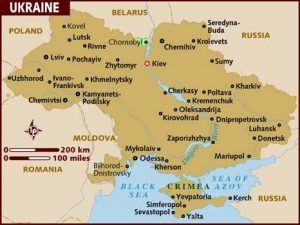
Russian Media Propaganda Uncovered
The following are all lies that have been spread by the Russian media leading up to the invasion of Ukraine by Russian troops:
1. FALSE: Kiev was Overrun by Violent Riots
Despite violent clashes, most of Kiev stayed peaceful throughout the demonstrations. The day-to-day lives of residents were largely unaffected outside of Independence Square and the areas immediately surrounding it. Very little of Kiev or the surrounding countryside was damaged or disturbed by the protests.
I know this because I called my family and friends every day. My nephews were going to school as usual, most of the people attended work on a daily basis, and all shopping malls and grocery stores were working (except for a few in the middle of the protest areas downtown).
2. FALSE: Anti-Russia Fascists Led the Ukrainian Protests
The vast majority of protesters were ordinary citizens tired of a government that they viewed as corrupt and unwilling to listen to the people. There were no fascist elements leading the demonstrations, and there are none leading the new government.
Many of the people I know personally were in Maidan: teachers, IT professionals, doctors, stay-at-home moms, businessmen, university professors, hair stylists and many others. People I worked with and went to school with. And no one will ever convince me that they are fascists. My daughter’s god-father is a surgeon and worked days and nights protecting the health and saving the lives of many.
3. FALSE: The New Government Will Force All Ukrainians to Speak Ukrainian
This is a particularly effective myth for Russian-language media, since it appeals directly to the people who would be most affected. Language has long been a contentious issue in Ukraine. Claims that Russian will be abolished are being used to generate anger against the new government.
The Ukrainian parliament voted to repeal a 2012 law allowing the establishment of minority languages as official state languages in individual provinces on February 23, 2014 but acting President Oleksandr Turchynov vetoed the move. Russian is currently recognized as an official language, is legal for state use in several Ukrainian provinces, and is guaranteed state protection “in all spheres of public life” in Crimea specifically.
I speak Russian and Ukrainian to my children here in the USA. I see language first and foremost as a tool for communication — and shame on any politicians who use it as a reason for war.
4. FALSE: Ukrainian Demonstrators Have Been Attacking Russians or Russian-Speakers
Another unproven and untrue claim widely circulated in Russian-language media is that the Euromaidan protesters were deliberately attacking Russian speakers.
The cruel result is that ordinary Russians – good, wholehearted, educated people – are now eager to help a Ukraine that they think is swamped by fascists! I have family in eastern Ukraine and my god-mother lives in Moscow. They have called multiple times, scared for the lives of my parents in Kiev. They really think Ukraine is in danger.
There is no evidence to support the claim, and nearly all cases of violence during the protest were perpetrated against civilians by security forces. The Euromaidan protests had very little to do with cultural or language issues in general.
While Yanukovych’s perceived obedience to the Russian government was certainly a source of anger in Ukraine, this anger was directed at the President and the actions of the Russian and Ukrainian governments, not to the Russian people or culture.
5. FALSE: The Berkut and Other Security Forces Fought in Self-Defense
Russian news broadcasts have shown extensive footage of the Berkut and other riot police under attack but nearly none of their attacks on civilians. The reality is that security forces attempted to crush peaceful protests with deadly force, and were barely driven back with improvised weapons like clubs and Molotov cocktails. The superior force and aggression were always on the side of the Berkut.
6. FALSE: The Independence Square/Euromaidan Protests Were Organized by Americans
We joke that EuroMaidan is now supported by Americans because my American husband and I made donations to help supply people with warm clothing and blankets during cold winter months.
I am not claiming that on a political level there is no lobbying of interests from outside countries and unions but once again: the politics of the country and the people of the country are two different things.
The vast majority of protesters were native Ukrainians and ordinary residents of Kiev and the surrounding country.
7. FALSE: Fascism Will Spread from Ukraine to Russia
This is another falsehood dependent on the idea that the Euromaidan demonstrators were fascist extremists. It is being used as a justification for Russian invasion. The Russian government claims it is defending Russian-speakers in Ukraine and its own borders from Ukrainian fascists but in reality those fascists do not exist.
What is next?
The military intervention is not over. It is hard to say what is going to happen next. There is a lot of talk going on at a very high, political level involving the EU and the US.
But Ukrainians have already had the biggest win in this struggle: themselves.
They proved to themselves that they care:
- They care about all of our people (amazing examples of collaboration happened during the civil unrest!);
- they care about the future of their country;
- they care about their freedom;
- they care enough to recognize the differences among themselves and to stay united anyway.
The revolution was heartbreaking and tearful but as a result, Ukrainians became true patriotic citizens of their country:
Glory to Ukraine, Glory to Heroes!
слава Україні, слава героїв
(slava Ukrayini, slava heroyiv)
For me, personally, it has been a life lesson in how to raise my own children. I have a clear goal to raise multicultural and multilingual children, who respect other languages and cultures and can see our shared humanity no matter how politicians try to divide us.
This is an original guest post to World Moms Blog by Olena Centeno.
 Olena Centeno is a Ukrainian who lives in USA, a happy mom of three wonderful kids ages 2-9 and a wife to the great. She speaks three languages herself and is raising her kids to be multilingual in English, Russian, Ukrainian and Spanish. She founded Bilingual Kids Rock, where she helps families on their bilingual journey. She also enjoys photography and video making as a way to preserve precious moments of life.
Olena Centeno is a Ukrainian who lives in USA, a happy mom of three wonderful kids ages 2-9 and a wife to the great. She speaks three languages herself and is raising her kids to be multilingual in English, Russian, Ukrainian and Spanish. She founded Bilingual Kids Rock, where she helps families on their bilingual journey. She also enjoys photography and video making as a way to preserve precious moments of life.
You can connect with her at Bilingual Kids Rock.
Photo credit to Oxlaey. This photo has a creative commons attribution license.
World Moms Blog is an award winning website which writes from over 30 countries on the topics of motherhood, culture, human rights and social good. Over 70 international contributors share their stories from around the globe, bonded by the common thread of motherhood and wanting a better world for their children.
World Moms Blog was listed by Forbes Woman as one of the "Best 100 Websites for Women 2012 & 2013" and also called a "must read" by the NY Times Motherlode in 2013. Our Senior Editor in India, Purnima Ramakrishnan, was awarded the BlogHer International Activist Award in 2013.
More Posts

by Kyla P'an (Portugal) | Mar 4, 2014 | 2014, Awareness, Being Thankful, Education, Human Rights, Humanity, Inspirational, Interviews, Kids, Life Lesson, Motherhood, Older Children, Social Good, Social Media, Technology, USA, Womanhood, World Voice, Younger Children
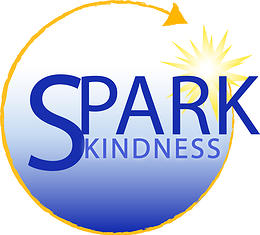 SPARK = Successful, Positive, Authentic, Resilient, Kids
SPARK = Successful, Positive, Authentic, Resilient, Kids
The moment you sit down with Christine Guthery, a funny transformation takes place, you find yourself swelling with optimism, self-confidence and personal-potential. It’s a gift Christine has, she simultaneously exudes these attributes and brings them out in others. She’s passionate about what she does and her enthusiasm has a way of igniting passion in others.
Christine is a lawyer by training but as the mother of three children (now ages 16, 9 and 7), she has discovered that her real calling is as a community activist and SPARK Kindness is community activism at its finest.
SPARK is the offshoot of a coalition called Parents against Bullying and Cyber-Bullying, which Christine founded in 2010, and its sister organization, the Metro-west [Boston] Anti-Bullying Coalition (ABC). The need for an anti-bullying coalition arose from a wide-spread, cyber-bullying incident at a local middle school, which impacted more than 90 students and their families in 2010.
Ironically, though neither Christine nor anyone in her family has ever been a victim of bullying, Christine is on a mission to prevent it. “Bullying is a social justice issue,” Christine says. “in order to rise above it, you have to be resilient, empowered, self-confident. I’m a lawyer by training and this idea of building resiliency inspires me. Everyone deserves to be treated with dignity and respect. That’s my cause.”
“The definition of ‘bully’ used to be pretty straightforward. It was a label once reserved for kids, who were considered outliers or playground thugs, the type of kids who committed physical acts on their victims. But times have changed. Now it’s not just the kids who are insecure or outcast that are doing the bullying, rather it’s also the popular kids, both boys and girls, who are trying to reach the top of their social/athletic/academic pyramid that can be the perpetrators,” Christine says.
“Not too long ago,” Christine continues, “a slanderous note passed around at school could impact a whole class of students or even a school community but when the kids went home at the end of the day, they left the incident at school. Now, with the Internet and smart phones, [and thanks to social media sites like Facebook, MySpace and Instagram,] bullying incidents can enter the cyber-sphere and quickly go viral. Kids have no way of leaving an incident behind them,” explains Christine. “In fact, these days, a great deal of bullying occurs during out-of-school-time.”
Christine believes that genocide and ethnic-cleansing—such as the ones that have occurred in Darfur, South Sudan and Nazi Germany—is “bullying taken to extreme measures.” And it’s really this mindset, this deep desire to eradicate the cause at it’s root, that has given rise to SPARK Kindness. The evolution came in 2012, when Christine realized that just talking about bullying wasn’t making progress.
“For two years [2010 & 2011] I had been focusing on bullying and trying to understand it better,” she says, “but then I realized, what if we shifted the conversation away from the outcome (bullying) and toward the prevention (nurturing kindness and resiliency)? What if our efforts were proactive rather than reactive?”
She compares this shift in mindset with the approach of Western medicine, where the focus is on addressing the illness, not on maintaining and promoting wellness. “I was finding that just talking about bullying was disempowering,” Christine reflects. “When I focused on the positives of resilience, kindness and courage, I felt empowered. It was exactly like the emotion of ‘elevation’ or self-transcendence that psychologist, Jonathan Haidt, described in his 2012 TED talk,” she says. “In other words, when you witness someone doing something positive or altruistic, it inspires you to do something positive or altruistic. This is where SPARK Kindness came from, how can we build the community we want rather than just address the ills we want to avoid?”
The answer:
teach children not just about kindness and emotional self-awareness early on but how to be resilient and seek support when they are feeling insecure or are suffering. SPARK Kindness, ignite positive change in your community.
 To find out ways to SPARK Kindness in your own community, click the logo above or visit http://www.sparkkindness.org/.
To find out ways to SPARK Kindness in your own community, click the logo above or visit http://www.sparkkindness.org/.
This post summarizes an interview between SPARK Kindness founder, Christine Guthery and World Moms Blog Managing Editor, Kyla P’an. This is a World Moms Blog exclusive interview.
Kyla was born in suburban Philadelphia but spent most of her time growing up in New England. She took her first big, solo-trip at age 14, when she traveled to visit a friend on a small Greek island. Since then, travels have included: three months on the European rails, three years studying and working in Japan, and nine months taking the slow route back from Japan to the US when she was done. In addition to her work as Managing Editor of World Moms Network, Kyla is a freelance writer, copy editor, recovering triathlete and occasional blogger. Until recently, she and her husband resided outside of Boston, Massachusetts, where they were raising two spunky kids, two frisky cats, a snail, a fish and a snake. They now live outside of Lisbon, Portugal with two spunky teens and three frisky cats. You can read more about Kyla’s outlook on the world and parenting on her personal blogs, Growing Muses And Muses Where We Go
More Posts - Website
Follow Me:


by Mamma Simona (South Africa) | Dec 9, 2013 | 2013, Africa, Cultural Differences, Death and Dying, Human Rights, Humanity, Inspirational, Politics, World Events
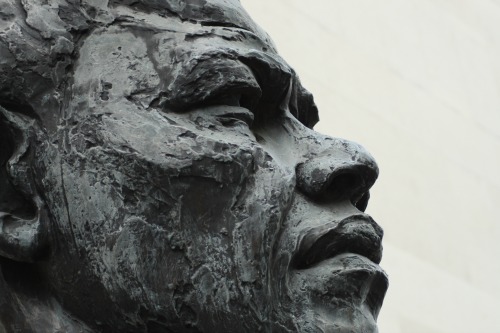
On December 5th, I woke up to the news that Nelson Rolihlahla Mandela, affectionately known as Madiba, had passed away after being “on his deathbed” for several months.
In the short time since his death, (not to mention during his many years of service to his country and world), so much has already been written and said about this great man that the only thing I can add is my personal story.
My parents, sister and I emigrated to South Africa from Italy in 1977. Back then, television and radio were heavily censored and through the media, we were taught that Nelson Mandela and the ANC (African National Congress) were “terrorists” who planted bombs and killed innocents.
Our lives were good and we didn’t question the segregation in government schools. My husband (whose family also emigrated from Italy a few years before mine) went to a private school where people of all religions and colors were happily accepted, as long as they could afford the fees.
In my opinion, Apartheid was never as rigorously enforced in Cape Town as it was elsewhere in the country. Be that as it may, most of us grew up blissfully unaware of human rights abuses and the like.
Fast forward to the 1990’s and most “white” people feared the worst. In fact, there were so many people leaving the country that a common saying was; “Will the last person to leave South Africa please switch off the lights?”
In my humble opinion it was Nelson Mandela, more than anyone else, who allowed South Africa to transition as smoothly as it did. The civil war which everyone feared just didn’t happen. Madiba revealed himself to be a man who was the polar opposite of whom many of us thought him to be (a “terrorist”). He earned everyone’s respect and admiration. He was a really great leader who never forgot where he came from. By that I mean that he never let “power” go to his head. He remained humble and approachable, and spread a message of peace and reconciliation. Mandela’s compassion and love for his fellow man are traits we’d all do well to emulate.
Sadly, the Presidents who have come after Nelson Mandela have betrayed his legacy. Madiba wanted everyone to have a better life. Sadly, things in this country have gone from bad to worse since Madiba stepped down. The most tragic part of all is that it is the very poor, “previously disadvantaged”, people who Madiba sought to empower who are worse off now than ever.
I feel I need to leave the last word to Dr. John Demartini, who wrote this in tribute to the great Nelson Mandela: ” From passive to activist and from prisoner to President one man became a legend in his lifetime though stationed in simplicity and limited in residence he moved the world. Nearly a century of living, but ultimately millenniums of presence, Nelson was contributive through the very core of his essence. It is time to reflect on his great accomplishments and revere his message. Let us all dig deeper into our own nature and find grace and poise since this one man’s direction was the purpose of freedom and presence not race. “
What one quality did you most admire in Nelson Mandela? How can use that quality in yourself to help make the world a better place?
R.I.P. Nelson Rolihlahla Mandela (1918 – 2013)
This is an original post for World Moms Blog by Mamma Simona from Cape Town, South Africa. She shares her home with a husband, 2 kids, 2 cats and 2 dogs.
Photo Credit To: Paul Simpson : Flickr Creative Commons
This photo has a creative commons attribution license.
Mamma Simona was born in Rome (Italy) but has lived in Cape Town (South Africa) since she was 8 years old. She studied French at school but says she’s forgotten most of it! She speaks Italian, English and Afrikaans. Even though Italian is the first language she learned, she considers English her "home" language as it's the language she's most comfortable in. She is happily married and the proud mother of 2 terrific teenagers! She also shares her home with 2 cats and 2 dogs ... all rescues.
Mamma Simona has worked in such diverse fields as Childcare, Tourism, Library Services, Optometry, Sales and Admin! (With stints of SAHM in-between). She’s really looking forward to the day she can give up her current Admin job and devote herself entirely to blogging and (eventually) being a full-time grandmother!
More Posts - Website
Follow Me:










 I was mentally sabotaging my morning run before the day even started. I laid in bed the night before thinking about how I was getting to sleep too late after eating too much junk when I knew I was coming down with a cold. I had not set myself up for success and felt guilty. I tried to tell myself if I was that beat tomorrow, I would skip it. I woke up in the middle of the night twice for other reasons but couldn’t help but think of how I tired I would feel come morning.
I was mentally sabotaging my morning run before the day even started. I laid in bed the night before thinking about how I was getting to sleep too late after eating too much junk when I knew I was coming down with a cold. I had not set myself up for success and felt guilty. I tried to tell myself if I was that beat tomorrow, I would skip it. I woke up in the middle of the night twice for other reasons but couldn’t help but think of how I tired I would feel come morning.












